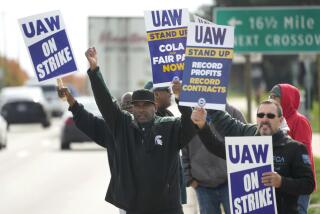Scottish Workers Occupy U.S.-Owned Tractor Plant to Prevent Closure
- Share via
UDDINGSTON, Scotland — The parking lot is empty and litter gathers at the edges of the lawns as Brian McLaughlan trudges across the vast, deserted floor of the Caterpillar tractor factory.
“The silence is the one thing I can’t get used to,” said McLaughlan, one of 850 workers occupying the plant in this suburb of Glasgow since Jan. 14, when the U.S.-based multinational firm announced it was closing its Scottish operation.
It might have been just another in a long list of factory closings Scotland has endured in recent years, except that only four months earlier, Caterpillar had announced Uddingston was to modernize and expand.
The 1,200 workers spent Christmas holidays thinking their livelihoods were assured into the 1990s. They came back to find themselves jobless.
Broken Promise
They feel that a promise has been broken and their lives shattered by decisions made in remote Peoria, Ill.
“Peoria could be a shack on the top of a mountain for all I know of it,” said John Brannan, the beefy, 40-year-old shop steward who is leading the workers.
The plant’s American manager, Ken Robinson, said, “We recognized the disappointment, anger and frustration” of the work force.
Although barred from the premises since the occupation began, management has taken a low-key approach. It has not tried to oust the occupiers, has not even cut off the telephone lines that are helping the workers rally support throughout Britain and in Europe.
Vow to Keep Fighting
Caterpillar said it will offer generous compensation. But at a mass meeting earlier this month, the workers voted by a 3-to-1 margin in a show of hands to continue the fight.
Robinson believes that hard-liners are setting the tone and that, given a secret ballot, the workers would vote 3-1 to accept a payoff. Indeed, the plant’s white-collar unions have already voted to abandon the occupation.
“There is no chance of the plant being kept open,” Robinson said in an interview.
Japanese competition and a contracting market have brought hard times for Caterpillar worldwide.
“Our first obligation is to survive,” the plant manager said. “We lost $1 billion over the years 1982, ‘83, ’84 and have reduced the number of jobs around the world from 90,000 to 50,000. The decision to close the plant was essential to our survival.”
Workers Bitter
Brannan, the shop steward, bitterly looks back six months, to the day the $98.4-million expansion program was announced.
The workers, he said, were told the money would be spent on new transmissions and undercarriage factories and on improving the chassis, blade-welding and tractor-assembly facilities.
The next weekend, management held an open house for workers’ families at the factory.
“They were telling us how rosy the future was and how secure our jobs were into the 1990s,” Brannan said. “There was free pop for the kids, cartoons in the auditorium, balloons, T-shirts, all this American-type fanfare stuff.”
As the staff left for Christmas, foundations were being dug for the new factories, he said.
Terse Announcement
Then, on Jan. 14, Robinson made a terse announcement of closure.
“We said that as far as we were concerned the plant remained open, and at 2:45 p.m. we occupied the plant. We said the management could come in once to take their personal belongings,” Brannan said.
Since then, 80 to 100 men and women have been at the plant continuously. To demonstrate their ability to maintain production, they assembled a bulldozer, painted it pink and delivered it to War on Want, a famine relief organization, just before management won an injunction to keep the vehicle inside the plant.
But they are in no position to go on making bulldozers, especially since management has warned that it would be illegal. So the workers spend time churning out leaflets and placards, covering a long corridor wall with letters and telegrams of support.
Lots of Sympathy
A massive wave of sympathy has broken over these tough, good-natured Scots. Trade union leaders from Caterpillar plants in France and Belgium have visited, and politicians and dignitaries flock to pay homage to what they see as a classic struggle between working people and the powerful multinational corporations.
An Uddingston barber offers free haircuts. A grocer sells the strikers cut-price food. Recently a butcher dropped off a free side of beef. Street collections are bringing in $21,000 a week.
Prime Minister Margaret Thatcher has appealed to Caterpillar to reconsider and has promised to study ways of reopening the plant under new ownership.
In going against her own free-market, anti-interventionist instincts, Thatcher has shown how important she considers Scotland, where her Conservative Party is politically weak and widely blamed for the 17% unemployment rate. But her pleas have been rejected.
Unexpected Holdout
Robinson, now operating out of a Glasgow hotel, admits he did not expect the workers to hold out this long.
“We are days, not weeks” from the point where management will take action to end the stalemate, he said.
He does not feel management broke a promise. He says British authorities overstated the expansion announcement and the work force was briefed on the company’s crisis as far back as 1983.
Inside the cavernous plant, brand-new machinery and half-finished expansion work show how swiftly calamity can befall even a giant like Caterpillar.
On a wall is a sign managers put up saying: “We Are Building a Community of Excellence at Glasgow--Get Involved--Make It Happen.”
“People took out mortgages and bought new cars on the strength of the promises,” said McLaughlan, a 36-year-old father of four. “What do we do now?”
More to Read
Sign up for Essential California
The most important California stories and recommendations in your inbox every morning.
You may occasionally receive promotional content from the Los Angeles Times.













